Understanding Sulfates and Sales Tax in Pool Service: Key Insights for Pool Professionals
As a pool service technician, staying ahead of potential issues and regulatory responsibilities is essential. In this episode of Talking Pools Podcast, Rudy Stankowitz dives into two critical yet often overlooked topics: the effects of sulfates in pool water and when pool service companies should be collecting sales tax. Both topics, while unrelated, have a significant impact on the longevity of pool structures and the smooth operation of your business. Here’s what you need to know.
The Hidden Danger: Sulfates in Pool Water
Sulfates, naturally occurring ions, can sneak into pool water through various means, including tap water and commonly used pool chemicals. While low levels of sulfates are not a cause for concern, high concentrations can wreak havoc on both pool equipment and structural components like stonework and concrete.
Why Should You Care About Sulfates?
Sulfates can be particularly damaging to saltwater pools. Salt cells, crucial to the operation of these pools, convert sodium chloride (NaCl) into hypochlorous acid, the active form of chlorine that disinfects pool water. Over time, high levels of sulfates can corrode the anode and cathode plates within the salt cell, leading to pitting and a decrease in efficiency. This can result in costly repairs and frequent replacements of the salt cell
Beyond the equipment, sulfates can also attack stone and concrete surfaces. The chemical process known as sulfate-induced corrosion occurs when sulfates react with calcium hydroxide in cement-based materials, forming calcium sulfate (also known as gypsum). This leads to cracking and spalling, which severely weakens pool walls and surrounding structures
If left unchecked, this deterioration could even lead to total pool failure, especially in saltwater environments where the corrosion process is accelerated.
similar article How Phosphate Removers work
How to Manage Sulfate Levels
To avoid these problems, it’s crucial to monitor sulfate levels in your pool water. The recommended maximum sulfate concentration is 300 parts per million (ppm), with levels exceeding 400-500 ppm significantly increasing the risk of damage to salt cells and concrete
Regular testing for sulfates, using specialized test kits like the turbidimetric method, should be part of your routine maintenance, especially in saltwater pools.
Several chemicals commonly used in pool maintenance can contribute to rising sulfate levels. These include:
- Sodium bisulfate (dry acid): Often used to lower pH, it introduces sulfates as a byproduct.
- Aluminum sulfate: Used as a flocculant and clarifier, and for reducing cyanuric acid, but adds sulfate ions to the water.
- Potassium monopersulfate (non-chlorine shock): While helpful in preventing chloramines, it also contributes to sulfate buildup
By limiting the use of these products and regularly testing sulfate levels, you can prevent costly damage to pool structures and equipment.
Sales Tax: Do You Need to Charge It?
Now, shifting gears from chemistry to business, let’s talk about sales tax. If you’re selling pool chemicals or equipment directly to customers, or even including chemicals as part of your pool service, you may need to charge sales tax. But how do you know when, and how, to apply it?
Are Pool Services Taxable?
The answer depends on your location. Sales tax laws vary significantly from state to state. In some states, labor or services like pool cleaning and maintenance are taxable. For example, Texas and New York both require sales tax to be charged on certain services. In these states, simply cleaning a pool without selling any physical goods may still require you to charge sales tax
similar article: How to Raise Service Prices | AQUA Magazine
In other states, like Florida and California, services that do not involve the sale of tangible personal property are generally considered non-taxable. However, if your service includes chemicals, like chlorine or pH adjusters, the entire service may be subject to tax because it involves the sale of a taxable product
How to Stay Compliant
To determine whether your services are subject to sales tax, consult your state’s Department of Revenue. If you do need to collect sales tax, you’ll first need to register for a sales tax permit. This process varies by state but generally involves providing basic business information like your business name, address, and Federal Employer Identification Number (FEIN). Once registered, you can legally collect sales tax from your customers
Make sure you track and remit the sales tax you collect to your state’s Department of Revenue, following their guidelines for filing and payment frequency (typically quarterly or monthly). Failure to comply with sales tax laws can result in penalties, so it’s important to stay on top of reporting requirements.
Tangible Goods and Bundled Transactions
For any physical products you sell, such as pool pumps, filters, or even a bucket of chlorine tablets, you will need to charge sales tax. It’s also important to note that in some states, if your service includes both labor and chemicals (a bundled transaction), the entire service may be taxable
Sulfates and sales tax
Sulfates and sales tax might seem like two completely unrelated topics, but both have a direct impact on the success of your pool service business. By keeping an eye on sulfate levels in your pool water and ensuring you’re compliant with sales tax regulations, you can prevent costly issues down the road. After all, maintaining pools isn’t just about keeping the water clean—it’s about protecting the structure and ensuring your business operations are running smoothly.
So next time you’re out in the field, remember to test for sulfates and double-check whether you’re charging sales tax correctly. These small actions can save you big headaches in the future.
If you have any questions or need more information, feel free to reach out. And as always, be good and be safe!






